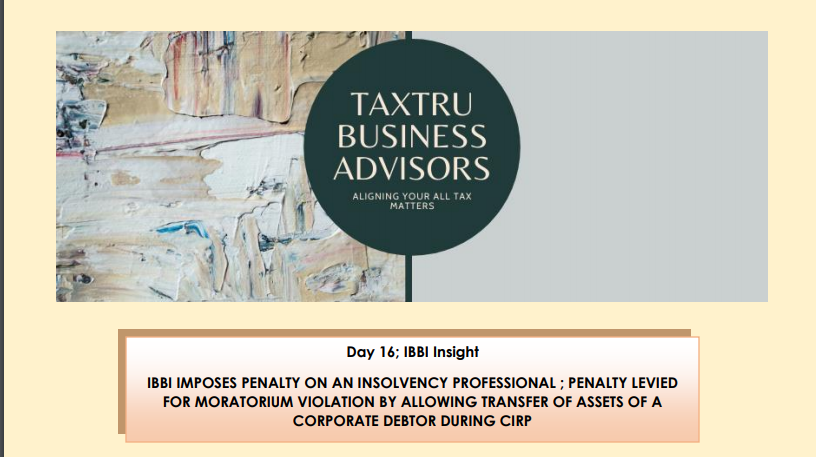IBBI Imposes Penalty on an Insolvency Professional; Penalty Levied For Moratorium Violation by Allowing Transfer of Assets of a Corporate Debtor During CIRP
IBBI Imposes Penalty on an Insolvency Professional; Penalty Levied For Moratorium Violation by Allowing Transfer of Assets of a Corporate Debtor During CIRP
1. Brief Facts of the Case:-
In exercise of its power under section 218 of the Code read with the IBBI (Inspection and Investigation) Regulations, 2017:-
- The Board vide Order appointed an Inspecting Authority (IA) to conduct an inspection of Mr. Mohan Lal Jain, on having reasonable grounds to believe that the IP had contravened provisions of the Code, Regulations, and directions issued thereunder.
2. Contravention:-
a) In the matter of Mack Soft Tech Private Limited, it was observed from the minutes of the 3rd CoC meeting dated 16th March 2018 that:-
i) The RP had sought approval from the CoC members to continue making payments through EMIs to HDFC Pvt. Ltd, one of the Financial Creditors of the CD.
ii) After obtaining approval from CoC members, the RP continued to make payments to HDFC during CIRP which is in violation of Section 14(1)(e) of the Code which states that transfer and disposal of any of the assets of the CD are prohibited during the CIRP.
iii) As per the minutes of the 10th CoC meeting dated 1st September 2018, the claim of HDFC Ltd. as per the revised list as on 27th August 2018 stood at Rs 1,08,34,362/- and this decrease in value of the admitted claim of HDFC from Rs. 22,45,49,456/- to Rs. 1,08,34,362/- was because of the regular payment of EMIs from the assets of CD during CIRP which is in contravention of Section 14 (1)(e) of the Code.
iv) Moreover, it was decided in the 10th CoC meeting that HDFC may recover the remaining EMIs from the Security deposit of Rs. 5,48,63,987/- available with HDFC.
3. Conclusion:-
i. The role of RP is vital to the efficient operation of the insolvency and bankruptcy resolution process. An IP exercises the powers of the Board of Directors of the firm under resolution manages its operations as a going concern, and complies with applicable laws on behalf of the firm.
ii. He conducts the entire insolvency resolution process: he is the fulcrum of the process and the link between the Adjudicating Authority and stakeholders – debtor, creditors – financial as well as operational, and resolution applicants.
iii. The process culminates in a resolution plan that maximizes the value of assets of the firm. The IP must apprise the members of the COC about the correct position of Law.
iv. The Code casts strenuous responsibilities on an IRP/ IP:-
- to run the affairs of the firm in distress as a going concern and to maximize the value of the assets.
- As the key objective of the Code is the maximization of the value of the assets, one needs to keep the assets of CD together during the CIRP and facilitate orderly completion of the processes envisaged during the insolvency resolution process and therefore, ensuring that the company may continue as a going concern while the creditors take a view on the resolution of default.
v. IP organizes all information relating to the assets, finances, and operations of the firm receives and collates the claims, prepares information memorandum, and provides access to relevant information so that there is complete symmetry of information among the entitled stakeholders while maintaining confidentiality. He thus addresses the market failure arising from information asymmetry.
vi. The resolution balances the interests of the stakeholders. This requires the services of a third person who does not side with any stakeholder and has no conflict of interests.
vii. The law casts this duty on the IP and makes several provisions to ensure his integrity, objectivity, independence, and impartiality. It also requires him to be a fit and proper person. Given the responsibilities, an IP requires the highest level of professional excellence.
viii. In this matter, the DC observes that:-
- IP displayed a casual and negligent approach during the conduct of CIRP. When a CD is admitted into CIRP, the Code shifts the control of a CD to creditors represented by a CoC for resolving its insolvency.
- The CoC holds the key to the fate of the CD and its stakeholders. Thus, several actions under the Code require the approval of the CoC.
- On the other hand, the IP must maintain absolute independence in the discharge of his statutory duties under the Code. In the present matter, the RP compromised his independence and continued making payment of EMIs to the FC during CIRP from the assets of the CD.
ix. Thus, IP has displayed utter misunderstanding of the provisions of the Code and Regulations made thereunder. He has, therefore, contravened provisions of:
i. Sections 14(1)(b) and Section 208 (2) (a) & (e) of the Code,
ii. Regulation 7(2)(a) and 7(2)(h) of the IBBI (Insolvency Professionals) Regulations, 2016 read with clause 10 and 14 of the Code of Conduct under the said Regulations.
Our Views:-
1. The main point that had to be examined in the present case was whether payment of EMIs to a financial creditor (HDFC in this case) made during the period of the moratorium in CIRP is in violation of IBC or not.
2. The RP not only failed to bring to the notice of the CoC the embargo imposed on the transfer of the assets of the Corporate Debtor during CIRP under Section 14 of IBC but also allowed the moratorium to be violated continuously by letting the EMIs to be deducted out of the cash flows/ rental income of the Corporate Debtor. This indicates RP’s casualness and negligence in performing his duty as RP and his misunderstanding of the law.
3. The IBC provision on ‘moratorium’ stipulates the prohibition of the institution of suits by or against the corporate debtor, transfer, alienation or disposal of any of the assets or legal rights or beneficial interest of the corporate debtor, action to
foreclose, recover or enforce any security interest created by the corporate debtor in respect to his property.
4. The moratorium period is analogous to the insolvency resolution process period.
Read the copy:
If you already have a premium membership, Sign In.














